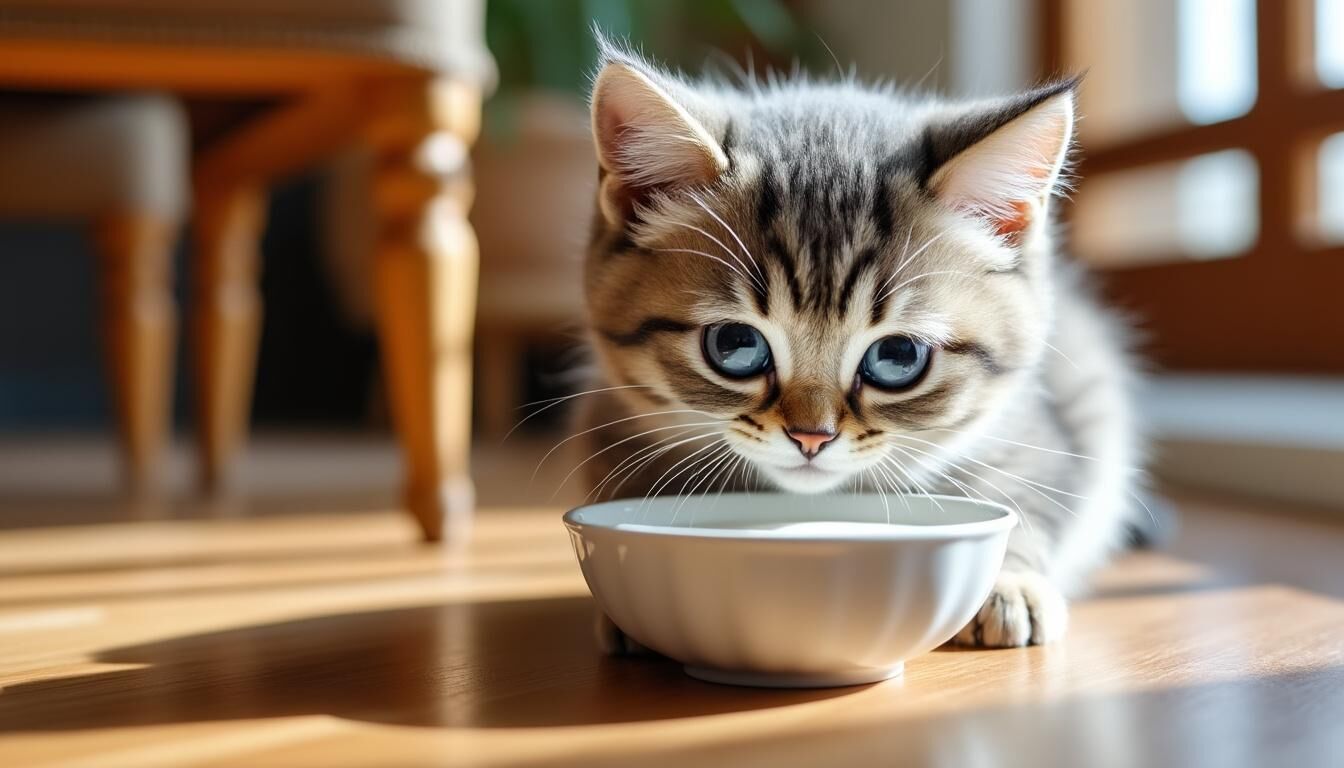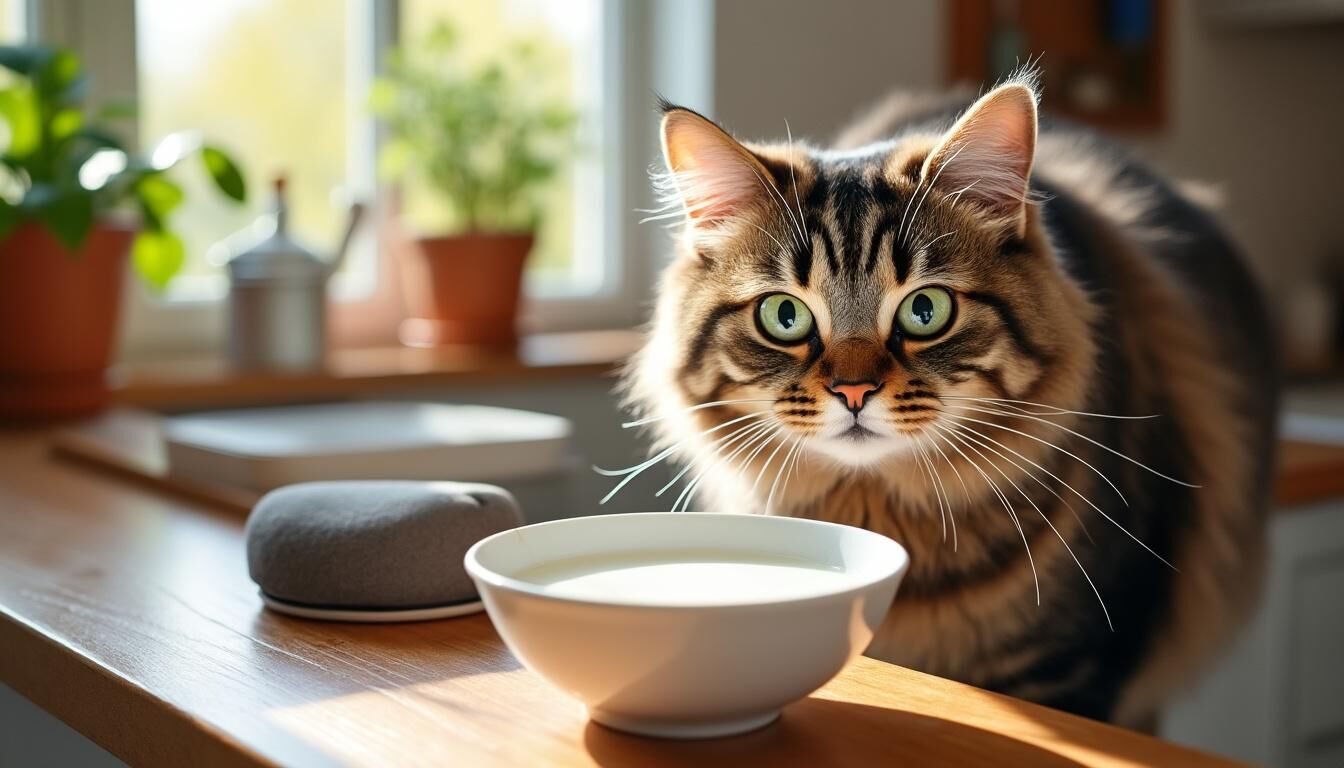Milk has long been associated with cats, conjuring images of a purring feline lapping up a bowl by the fireside. This charming portrait has fueled a widespread belief that milk is an ideal treat for cats, often depicted in cartoons and popular culture from New York City cafés to countryside homes. However, scientific insights reveal a more complex story. Although kittens thrive on their mother’s milk, most adult cats gradually lose the ability to digest lactose, the sugar in milk, making regular milk consumption potentially harmful. This discrepancy between cultural myth and biological reality explains why veterinarians increasingly caution pet owners about milk’s actual effects on cats’ digestive systems and overall health. The persistent notion that milk serves as a wholesome source of hydration and nutrition conflicts with findings that milk can trigger discomfort, including diarrhea and bloating, in lactose intolerant cats. To provide cats with safe hydration and balanced nutrients, understanding their unique dietary needs and the risks posed by cow’s milk and other dairy products becomes essential.
Can Cats Drink Milk? Debunking Myths and Exploring Feline Milk Tolerance
Why Is Milk Believed to Be Good for Cats? The Origins of the Milk Myth
The image of a cat enjoying a saucer of milk is almost universal, deeply ingrained through cultural portrayals in books, movies, and folklore. This portrayal dates back to agrarian societies where barn cats gathered around milk bowls left after milking cows, giving rise to the assumption that milk is a natural, beneficial food for cats. Victorian literature and early cartoons further cemented this association, portraying milk as an easy, loving treat from humans to their feline companions.
Milk appeared to symbolize comfort and affection, reinforcing emotional bonds and prompting generations of cat owners to offer milk as a treat. The benign nature of milk, combined with the soft image of milk-drinking kittens, shaped an enduring myth that is hard to dispel. Ironically, in some regions like New York City, specialty cafes for cats have capitalized on this perception, offering “cat milk” as a luxury treat, despite cats’ actual dietary requirements.
Yet, this tradition overlooks the biological changes in cats after weaning. While the myth was shaped by cultural interpretations and observed behaviors, it often ignores veterinary advice or the basic science of feline digestion. This disconnect has led to cases where well-meaning pet owners inadvertently expose their cats to digestive upset through regular milk consumption.
-
🐱 Cultural depictions encourage giving milk to cats as a sign of affection.
-
🥛 Historic barn cats often accessed milk naturally, shaping myths.
-
📺 Media and advertising continue to promote milk as a desirable cat treat.
-
🏙 Specialized “cat milk” products in cities like New York City play on this notion.
-
🔬 Scientific evidence highlights that milk isn’t an ideal feline food for most cats.
Lactose Intolerance in Cats: What Science Says About Adult Cats and Milk
From Kittens to Adults: Nutritional Needs and Mother’s Milk vs. Cow’s Milk
Kittens are naturally designed to drink their mother’s milk, which contains the essential nutrients for early development, including the right balance of proteins, fats, and sugars combined with immune factors. The enzyme lactase, necessary to break down lactose, is present in high levels in suckling kittens. This enzyme allows them to digest their mother’s milk properly.
As kittens mature, the production of lactase declines steeply. By adulthood, most cats become lactose intolerant, lacking sufficient lactase to digest the lactose found in milk, especially cow’s milk. Unlike feline milk, animal milk intended for human consumption is formulated for human babies’ nutritional needs, not feline health. It contains lactose amounts that challenge most adult cats’ digestive systems.
Feeding cow’s milk to adult cats can thus cause discomfort, leading to adverse digestive reactions. The veterinary field confirms this lactose intolerance is common, making cow’s milk an unsuitable substitute for feline-specific milk replacers designed to mimic mother’s milk for orphaned kittens or those with special dietary needs.
-
🍼 Kittens require mother’s milk with precise nutrients.
-
✔ High lactase enzyme activity in kittens allows lactose digestion.
-
🚫 Lactase declines as cats age, causing adult lactose intolerance.
-
🥛 Cow’s milk differs fundamentally from feline milk in composition.
-
⚠️ Feeding cow’s milk to adults risks digestive problems and nutrient imbalance.
Symptoms of Lactose Intolerance in Cats: Key Warning Signs for Pet Owners
When a lactose intolerant cat consumes milk, symptoms usually appear within a few hours. The unabsorbed lactose reaches the colon, where bacteria ferment it, producing gases and drawing water into the intestines.
Common symptoms include:
-
💨 Bloating and flatulence
-
💩 Diarrhea, sometimes severe and watery
-
🤢 Vomiting
-
🔴 Abdominal pain or discomfort
-
😿 Lethargy or irritability
Observing such signs after milk consumption should prompt owners to discontinue milk immediately and consult a veterinarian. Persistent issues may require assessment to rule out other digestive or allergic conditions often triggered by inappropriate diet components.
|
Symptom 🐾 |
Description 📋 |
Onset Time ⏳ |
|---|---|---|
|
Diarrhea 💩 |
Watery or loose stools caused by undigested lactose fermenting in the gut. |
Within 2-6 hours |
|
Bloating 💨 |
Gas accumulation leading to visible abdominal swelling and discomfort. |
1-4 hours |
|
Vomiting 🤢 |
Reflux of stomach contents, sometimes triggered by irritation. |
1-6 hours |
|
Lethargy 😿 |
Reduced energy indicating systemic response to digestive upset. |
Variable |
Safe Milk Alternatives and Guidelines: Choosing the Best Fluids for Your Cat’s Health
Types of Milk and Dairy Products: How They Affect Cats
Not all milk products affect cats equally. The milk in cow’s milk, goat’s milk, and sheep’s milk naturally contains lactose, but levels vary:
-
🥛 Cow’s milk: High lactose content, frequently causes intolerance symptoms.
-
🐐 Goat’s milk: Slightly lower lactose, possibly better tolerated by some cats, but lactose intolerant cats can still have problems.
-
🐑 Sheep’s milk: Rich in fat and protein but also contains lactose, potentially problematic in excess.
-
🧀 Fermented dairy products (yogurt, kefir, sour cream, aged cheese): During fermentation, lactose is converted into lactic acid, reducing lactose levels and making these easier to digest for mildly intolerant cats.
Due to the high fat content in these milks, there is also a risk of weight gain if given regularly. Adults do not require milk as a hydration or nutrition source; improper balance of nutrients and excessive fat in dairy can contribute to obesity and other health issues.
|
Milk Type 🥛 |
Lactose Level (%) |
Fat Content (%) |
Digestive Risk for Cats ⚠️ |
|---|---|---|---|
|
Cow’s milk |
4.7% |
3.5% |
High – causes diarrhea in most adult cats |
|
Goat’s milk |
4.1% |
4.5% |
Moderate – may be tolerated by some cats |
|
Sheep’s milk |
4.8% |
6-7% |
High due to fat and lactose |
|
Fermented products |
Lower (< 1%) |
Varies |
Lower risk – better digestion for some |
Regular Milk, Lactose-Free Options, and Fermented Dairy Products: Risks and Benefits
Many pet owners seek lactose-free alternatives. Lactose-free milk on the market, both human-grade and feline-formulated, contains lactase enzymes that pre-digest lactose, making consumption easier for lactose intolerant cats. Specially developed cat milk products often contain added taurine and tailored nutrients beneficial to cats, distinguishing them from regular lactose-free milk, which does not provide feline-specific nutrition.
While lactose-free options reduce the risk of digestive upset, they should remain an occasional treat. Overreliance on milk alternatives, even lactose-free, could unbalance the cat’s diet if they replace balanced meals or water intake.
-
🥛 Regular milk risks diarrhea in most cats.
-
✔ Lactose-free milk is safer but not a dietary staple.
-
🧴 Fermented dairy products may be tolerated in small quantities.
-
⚠ High fat content in dairy can lead to obesity if given often.
-
🐾 Specially formulated cat milk supports nutrition better than human-grade milk.
Expert Recommendations: Hydration, Special Circumstances, and When Milk Is (and Isn’t) Safe
Experts strongly recommend fresh water as the primary fluid for cat hydration. Water is essential to maintain kidney function, regulate body temperature, and support overall health. Milk does not substitute for water because it contains nutrients cats don’t need in excess and may cause digestive issues due to its lactose and fat content.
To encourage water intake, owners might try:
-
💧 Providing a water fountain to entice drinking
-
💧 Offering cold water or dripping taps
-
💧 Adding water to wet cat food to increase fluid consumption
-
💧 Regularly changing water to keep it fresh
Veterinarians sometimes recommend milk replacers or supplements in special cases such as orphaned kittens, recovery from illness, or weight gain support. These products should be used only under professional guidance, ensuring the correct balance of nutrients and avoiding complications associated with unprocessed milk.
Additionally, milk given as an occasional treat in very small amounts (a few teaspoons to a tablespoon once or twice a week) may be tolerated by some cats. Yet, pet owners must monitor reactions closely and consult a veterinarian if any adverse signs arise. A practical approach respects the individual tolerance of each cat while prioritizing their health.
Plant-Based Milk Alternatives: Why Almond, Soy, and Oat Milk Are Not Cat-Friendly
Plant-based milks such as almond, soy, coconut, and oat are often perceived as healthy human alternatives. However, for cats, they pose multiple issues. These drinks are not formulated for carnivorous animals and commonly contain added sugars, oils, thickeners, preservatives, and salts harmful to cats. Their nutritional profile does not meet a cat’s requirements and may trigger digestive upset or toxicity.
Although a brief lick or taste is unlikely to be toxic, regular consumption of plant-based milks can lead to gastrointestinal disturbances, including diarrhea and vomiting.
Veterinary advice cautions against substituting water or cat milk with plant-based milk, emphasizing their lack of critical amino acids and potential additives that stress feline metabolism.
-
🌰 Almond milk contains preservatives and sweeteners unsuitable for cats.
-
🌾 Soy milk may cause allergies or digestive upset.
-
🥥 Coconut milk is high in fat and additives.
-
🌾 Oat milk is carb-rich and lacks essential feline nutrients.
-
❌ Plant-based milks should never replace fresh water.
|
Milk Type 🥛 |
Suitability for Cats 💡 |
Risks ⚠️ |
Comments 🐱 |
|---|---|---|---|
|
Almond Milk |
Poor |
Preservatives, sugars, toxic additives |
May cause diarrhea or allergy |
|
Soy Milk |
Poor |
Allergenic potential, digestive distress |
Unsuitable for regular feeding |
|
Coconut Milk |
Poor |
High fat, additives, laxative effect |
Only incidental tasting safe |
|
Oat Milk |
Poor |
High carbohydrates, low protein |
No nutritional value for cats |

Expert Insights from Veterinarians and Nutritionists
Veterinarians nationwide emphasize that milk is not an essential or recommended component of a cat’s diet. Dr. Lena Watts, a feline nutrition specialist, notes: “Most adult cats are naturally lactose intolerant. Milk does not provide necessary nutrition and can cause digestive upset, including uncomfortable diarrhea and bloating.”
Nutritionist Tom Richards adds, “Cats need balanced nutrition tailored to their carnivorous systems. Milk is often high in sugars and fat that promote weight gain if consumed regularly.” Both experts encourage always consulting a veterinarian before introducing any milk substitutes or novel fluids, especially in kittens or cats with health challenges.
In everyday care, regular water intake remains paramount, while milk should remain a rare indulgence, accompanied by close observation of tolerance.
FAQ
-
Can all cats drink milk safely?
No, most adult cats are lactose intolerant and may suffer from diarrhea, bloating, or vomiting when given milk. -
Is there a safe type of milk for cats?
Specially formulated lactose-free cat milk products are the safest, but should only be given occasionally as a treat. -
Can kittens drink cow’s milk?
Kittens require mother’s milk or veterinary-approved milk replacers; cow’s milk is not an adequate substitute and can cause digestive issues. -
Are plant-based milks safe for cats?
Generally no; almond, soy, oat, and other plant milks contain additives that may upset digestion and offer no nutritional benefit. -
What is the best fluid for keeping cats hydrated?
Fresh clean water is the best and safest option. Encouraging them to drink through fountains or food moisture helps maintain hydration.

